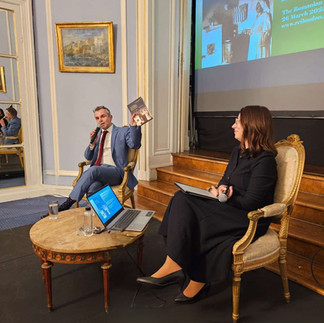Foreign Aid and State Building
- officelondon
- Feb 26, 2025
- 2 min read
in Interwar Romania

Continuing our celebrated series of book launch events, spotlighting UK-based academics whose research explores Romania and related topics, we had the pleasure of launching "Foreign Aid and State Building in Interwar Romania: In Quest of an Ideal" (Stanford University Press, 2024), the first monograph authored by Dr. Anca Crețu of Warwick University. Introduced by RCI London director Aura Woodward, the talk was full of insights into lesser-known historical and political dimensions of foreign aid and governance in interwar Romania, sparking stimulating discussions and questions from the audience. It was a privilege to witness Dr. Crețu engage in such a rich dialogue with cultural historian James Koranyi of Durham University. Their conversation, set within a broader European context, was nothing short of enlightening.
We have been welcoming Dr. Doina Anca Cretu (University of Warwick) as she launches her first monograph, “Foreign Aid and State Building in Interwar Romania: In Quest of an Ideal” (Stanford University Press, 2024). The evening featured an insightful dialogue between Dr. Cretu and Dr. James Koranyi (Durham University), himself the author of a Romania-related volume: “Migrating Memories: Romanian Germans in Modern Europe” (Cambridge University Press, 2021). Together, they explored the historical and political dimensions of Romania’s past and its broader European context.
🗓️ When: Wednesday 26 February, 7 pm
📍 Where: RCI London, 1 Belgrave Square
Many thanks to our guest speakers, whose research developments we look forward to discovering, and also to everyone who joined us with keen interest.
The decades following World War I were a period of political, social, and economic transformation for Central and Eastern Europe. Dr. Doina Anca Cretu's “Foreign Aid and State Building in Interwar Romania: In Quest of an Ideal” (Stanford University Press, 2024) considers the role of foreign aid in Romania between 1918 and 1940, offering a new history of the interrelation between state building and nongovernmental humanitarianism and philanthropy in the interwar period. The author argues that Romania was a laboratory for transnational intervention, as various state builders actively pursued, accessed, and often instrumentalised American assistance to accelerate reconstructive and modernising projects after World War I.



























Comments